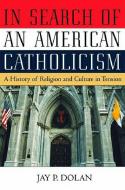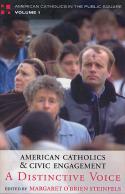Issue Date: May 21, 2004
Two books look at the history and identity of American Catholics Reviewed by JEFFREY MARLETT Apart from the sound-bite studies brought on by American Catholicism’s recent crisis, what have scholars and commentators done to adjust their understanding of this institution? While somewhat similar in focus, two recent books take quite different approaches to the study of American Catholic life and history. Jay P. Dolan offers a grand historical narrative attuned to American life, while Margaret O’Brien Steinfels demonstrates the intellectual and political diversity within the church’s singular -- though admittedly very broad -- community. Everybody who studies American Catholicism owes Jay P. Dolan a significant intellectual debt. Along with David O’Brien, Christopher Kauffman and Philip Gleason, Dolan created the modern historical study of the American Catholic church. His publications on American Catholic life, including revivalism, the immigrant church and parish life, remain essential reading. Dolan first applied social history methods to American Catholicism’s past, and thus told the story from the bottom up. In doing so, he revealed the American church’s intellectual and theological diversity. His leadership of Notre Dame’s Cushwa Center provided a much-needed intellectual discussion space for emerging scholars. Everything you read about American Catholicism today bears Dolan’s mark. In Search of an American Catholicism allows Dolan to examine a familiar theme: the ways in which Roman Catholicism -- a faith community grounded in tradition and hierarchical authority -- acclimated itself to American life, a culture grounded in the opposite values of novelty and individualism. Like he has before, Dolan carries this off effortlessly. Five chapters cover the colonial period to 2001. The American Revolution and the Enlightenment inspired a new and uniquely American expression of Roman Catholicism. This new vision rejected hidebound European traditionalism just as vigorously as other Americans did. Nevertheless, Catholicism did not devolve into the radical individualism that came to characterize evangelicalism. American Catholicism’s well-known subculture came from the enormous immigrant tide of the 19th century. As anti-Catholic nativism increased, the church withdrew into itself, led by an immigrant clergy with loyalties to Rome stronger than to their own neighbors. During the crucial decades between 1880 and 1920, American Catholics discussed the limits of Americanizing the church -- its doctrines as well as the immigrants who filled its pews. The nation’s democratic culture also inspired Catholic women to reconsider their subordinate position within the church. Despite stereotypes of Catholic rigidity, Dolan argues that American Catholic parochialism actually decreased over the 20th century. On the other hand, the Vatican’s theological worldview became increasingly conservative after the refreshing but brief Vatican II period. This, Dolan argues, leaves American Catholicism with the stark choice between American culture’s democratic and individualistic temptations and the church’s centralized bureaucracy in Rome. A postscript soberly addresses the heightened tension following the clergy sexual abuse scandal. Dolan celebrates the permanence of change within the American Catholic church, and he concludes with the observation that only further change will heal these latest wounds. This is one case where the book’s cover indicates something about the contents. The cover photo for In Search of an American Catholicism depicts a church’s door flanked by the American and Vatican flags. The Stars and Stripes stand tellingly to the viewer’s left, while the papal yellow occupies the right. Dolan’s narrative follows suit. Likewise, it resembles the Puritan jeremiad, one of the nation’s oldest forms of religious and historical writing. It takes an all-encompassing vision -- and Puritanism certainly was that -- to make the jeremiad persuasive. Dolan’s focus on democracy provides this vision and thus fuels his wistful examination of the church. He fears that the right-hand flag will eventually overwhelm the one on the left. Well-known as the editor of Commonweal from 1988 to 2002, Margaret O’Brien Steinfels teamed with the Faith & Reason Institute, a conservative Catholic think tank in Washington, to organize “American Catholics in the Public Square,” a three-year (2000 to 2002) project supported by the Pew Charitable Trust. The project sought to identify and strengthen the distinctive elements of American Catholicism’s public life; foster discussion between those along the broadest spectrum of Catholic opinion, as well as among the media; and consider how Catholics inspired by this distinctiveness might work with people of other faiths. Representing the first of four volumes, American Catholics and Civic Engagement consists of 23 contributions covering three categories: Catholic thought in the American context, Catholic institutions, and autobiographies of Catholic public life. Steinfels’ contributors indicate that American Catholic diversity actually thrives. Washington Post columnist E.J. Dionne Jr.’s title captures this wonderfully: “There Is No Catholic Vote -- And It’s Important.” Dionne argues that the American Catholic electorate defies all labels with its diversity, while its numbers situate it as the “ultimate swing vote” for both Democrats and Republicans. The book offers an instructive juxtaposition of liberal and conservative voices. For the introduction, Steinfels’ husband, Peter, provides a balanced and insightful historical overview. The essays range from starchy academic-speak to frank and homey personal confession. The sheer diversity of autobiographical pieces (14 in all) supports categorizing the book as a “fox” and not a “hedgehog.” The contributors clearly feel their Catholic faith inspires or informs their civic duties. The expressions vary from the pietistic to the familiar East-coast Irish-Catholic reminiscence. When the autobiographies reveal the smorgasbord character of Catholics’ regard for the church’s social and spiritual teaching, this panoply carries a certain realism that avoids uncritical endorsement or condemnation. Liberalism enjoys a Catholic fan base that includes, besides Dolan, academics such as Michael Lacey and William Shea. Their argument for an American Catholic communitarianism that fully embraces American life and democratic culture closely parallels Dolan’s argument. Charles Cochrane’s analysis of Catholic health care institutions details the struggles and occasional victories in acclimating to the American mainstream. Jane Mansbridge and John Coleman clarify the stakes for both favoring and opposing the church’s social, not individual, vision for the public good. Both books understand the crucial need for accessibility, and both, within their respective frameworks, achieve this goal. This success makes both titles appropriate for parish groups, interested readers and even the usually disinclined undergraduate student. It is important that the two books pursue different agendas. Dolan’s more elegiac book ponders the church’s uncertain future. Given the church’s still-unfolding crisis, his lack of optimism certainly appears understandable. Steinfels’ compilation exudes the spirit of James Joyce’s adage that “Catholicism means ‘here comes everybody,’ ” celebrating the diversity within American Catholicism’s already distinctive presence. Steinfels’ contributors demonstrate the various ways in which faith, sometimes tenuously and other times with astonishing confidence, continues to move Catholics into American public life. Jeffrey Marlett teaches religious studies at the College of Saint Rose in Albany, N.Y. National Catholic Reporter, May 21, 2004 |

